Related Research Articles

Fascism is a far-right, authoritarian, ultranationalist political ideology and movement, characterized by a dictatorial leader, centralized autocracy, militarism, forcible suppression of opposition, belief in a natural social hierarchy, subordination of individual interests for the perceived good of the nation or race, and strong regimentation of society and the economy.
The relations between the Catholic Church and the state have been constantly evolving with various forms of government, some of them controversial in retrospect. In its history, the Church has had to deal with various concepts and systems of governance, from the Roman Empire to the medieval divine right of kings, from nineteenth- and twentieth-century concepts of democracy and pluralism to the appearance of left- and right-wing dictatorial regimes. The Second Vatican Council's decree Dignitatis humanae stated that religious freedom is a civil right that should be recognized in constitutional law.
Clerical fascism is an ideology that combines the political and economic doctrines of fascism with clericalism. The term has been used to describe organizations and movements that combine religious elements with fascism, receive support from religious organizations which espouse sympathy for fascism, or fascist regimes in which clergy play a leading role.

The National Union was the sole legal party of the Estado Novo regime in Portugal, founded in July 1930 and dominated by António de Oliveira Salazar during most of its existence.
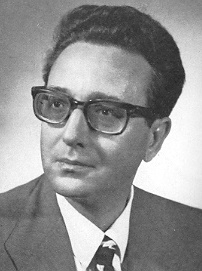
Giuseppe Umberto "Pino" Rauti was an Italian fascist and politician who was a leading figure on the radical right for many years. Involved in active politics since 1948, he was one of founders and, for many years, the leader of the Italian Social Movement (MSI). He was the main representative of the MSI's “moderates”.
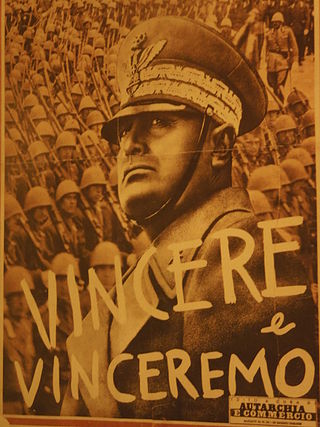
The history of fascist ideology is long and it draws on many sources. Fascists took inspiration from sources as ancient as the Spartans for their focus on racial purity and their emphasis on rule by an elite minority. Fascism has also been connected to the ideals of Plato, though there are key differences between the two. Fascism styled itself as the ideological successor to Rome, particularly the Roman Empire. From the same era, Georg Wilhelm Friedrich Hegel's view on the absolute authority of the state also strongly influenced fascist thinking. The French Revolution was a major influence insofar as the Nazis saw themselves as fighting back against many of the ideas which it brought to prominence, especially liberalism, liberal democracy and racial equality, whereas on the other hand, fascism drew heavily on the revolutionary ideal of nationalism. The prejudice of a "high and noble" Aryan culture as opposed to a "parasitic" Semitic culture was core to Nazi racial views, while other early forms of fascism concerned themselves with non-racialized conceptions of the nation.
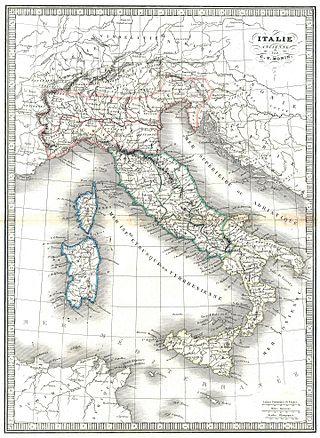
Italian fascism, also classical fascism and Fascism, is the original fascist ideology, which Giovanni Gentile and Benito Mussolini developed in Italy. The ideology of Italian Fascism is associated with a series of political parties led by Mussolini: the National Fascist Party (PNF), which governed the Kingdom of Italy from 1922 until 1943, and the Republican Fascist Party (PFR), which governed the Italian Social Republic from 1943 to 1945. Italian fascism also is associated with the post–war Italian Social Movement (MSI) and later Italian neo-fascist political organisations.
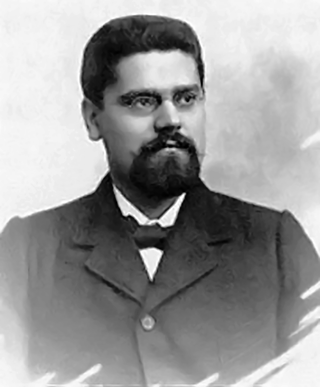
The "Manifesto of Fascist Intellectuals", by the actualist philosopher Giovanni Gentile in 1925, formally established the political and ideologic foundations of Italian Fascism. It justifies the political violence of the Blackshirt paramilitaries of the National Fascist Party, in the revolutionary realisation of Italian Fascism as the authoritarian and totalitarian rėgime of Prime Minister Benito Mussolini, who ruled Italy as Il Duce, from 1922 to 1943.
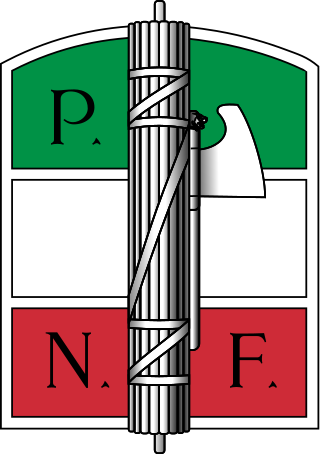
The National Fascist Party was a political party in Italy, created by Benito Mussolini as the political expression of Italian fascism and as a reorganisation of the previous Italian Fasces of Combat. The party ruled the Kingdom of Italy from 1922 when Fascists took power with the March on Rome until the fall of the Fascist regime in 1943, when Mussolini was deposed by the Grand Council of Fascism. It was succeeded, in the territories under the control of the Italian Social Republic, by the Republican Fascist Party, ultimately dissolved at the end of World War II.

The National Radical Camp was an ultranationalist and antisemitic political movement which existed in the pre-World War II Second Polish Republic, and an illegal Polish anti-communist, and nationalist political party formed on 14 April 1934 mostly by the youth radicals who left the National Party of the National Democracy movement.

Fascist movements in Europe were the set of various fascist ideologies which were practiced by governments and political organizations in Europe during the 20th century. Fascism was born in Italy following World War I, and other fascist movements, influenced by Italian Fascism, subsequently emerged across Europe. Among the political doctrines which are identified as ideological origins of fascism in Europe are the combining of a traditional national unity and revolutionary anti-democratic rhetoric which was espoused by the integral nationalist Charles Maurras and the revolutionary syndicalist Georges Sorel.

The Italian racial laws, otherwise referred to as the Racial Laws, were a series of laws which were promulgated by the Mussolini government in Fascist Italy (1922–1943) from 1938 to 1944 in order to enforce racial discrimination and segregation in the Kingdom of Italy. The main victims of the Racial Laws were Italian Jews and the native African inhabitants of the Italian colonial empire (1923–1947). In the aftermath of Mussolini's fall from power and the invasion of Italy by Germany, the Badoglio government suppressed the laws in January 1944. They remained enforced and were made more severe in the territories ruled by the Italian Social Republic (1943–1945) until the end of the Second World War.
The term Alfonsism refers to the movement in Spanish monarchism that supported the restoration of Alfonso XIII of Spain as King of Spain after the foundation of the Second Spanish Republic in 1931. The Alfonsists competed with the rival monarchists, the Carlists, for the throne of Spain.

The Italian Social Movement was a neo-fascist political party in Italy. A far-right party, it presented itself until the 1990s as the defender of Italian fascism's legacy, and later moved towards national conservatism. In 1972, the Italian Democratic Party of Monarchist Unity was merged into the MSI and the party's official name was changed to Italian Social Movement – National Right.

National syndicalism is a far-right adaptation of syndicalism to suit the broader agenda of integral nationalism. National syndicalism developed in France in the early 20th century, and then spread to Italy, Spain, and Portugal.
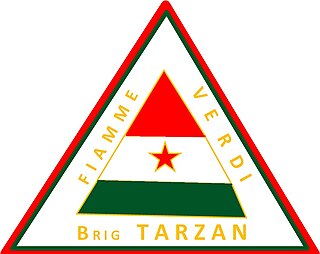
The Brigate Fiamme Verdi was an Italian Partisan Resistance Group, of predominantly Roman Catholic orientation, which operated in Italy during World War II.
Fascist syndicalism was an Italian trade syndicate movement that rose out of the pre-World War II provenance of the revolutionary syndicalist movement led mostly by Edmondo Rossoni, Sergio Panunzio, Angelo Oliviero Olivetti, Michele Bianchi, Alceste De Ambris, Paolo Orano, Massimo Rocca, and Guido Pighetti, under the influence of Georges Sorel, who was considered the "'metaphysician' of syndicalism". The fascist syndicalists differed from other forms of fascism in that they generally favored class struggle, worker-controlled factories and hostility to industrialists, which lead historians to portray them as "leftist fascist idealists" who "differed radically from right fascists." Generally considered one of the more radical fascist syndicalists in Italy, Rossoni was the "leading exponent of fascist syndicalism", and sought to infuse nationalism with "class struggle".

The Kingdom of Italy was governed by the National Fascist Party from 1922 to 1943 with Benito Mussolini as prime minister and dictator. The Italian Fascists imposed totalitarian rule and crushed political opposition, while promoting economic modernization, traditional social values and a rapprochement with the Roman Catholic Church.
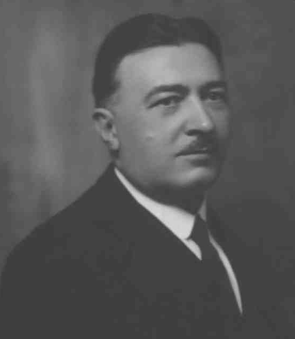
Stefano Cavazzoni (1881–1951) was an Italian politician who served as the minister of labour between October 1922 and April 1923. He was also a member of the parliament and senate.
References
- Atkin, Nicholas, and Tallett, Frank. 2003. Priests, Prelates, and People: A History of European Catholicism Since 1750. Oxford University Press. ISBN 0-19-521987-2
- Blinkhorn, Martin. 1990. Fascists and Conservatives: The Radical Right and the Establishment in twentieth-century Europe. Routledge. ISBN 0-04-940087-8
- Pollard, John. 1996. "Italy" in Political Catholicism in Europe, 1918-1965. Eds. Torn Buchanan and Martin Conway. Oxford University Press. ISBN 0-19-820319-5